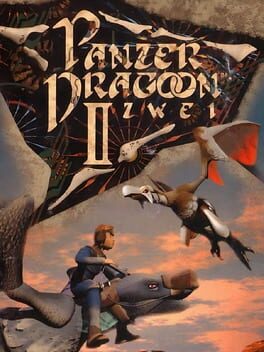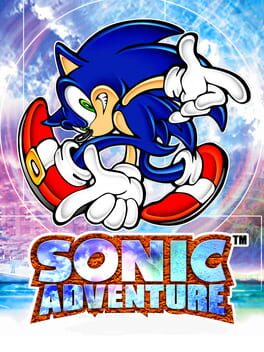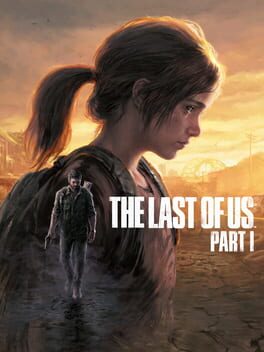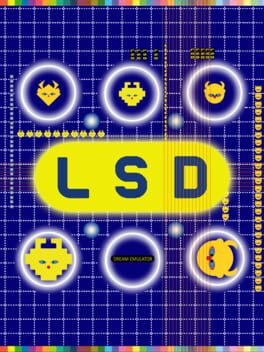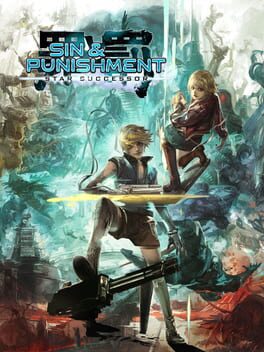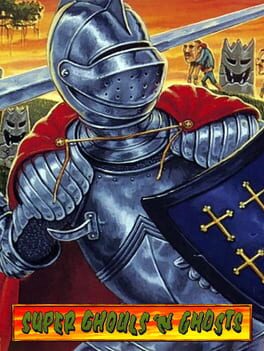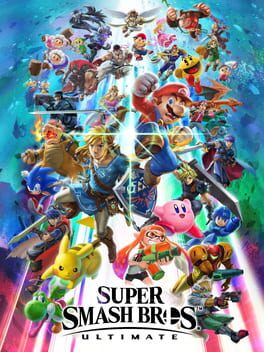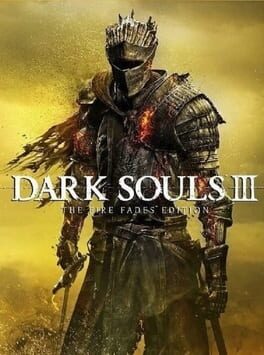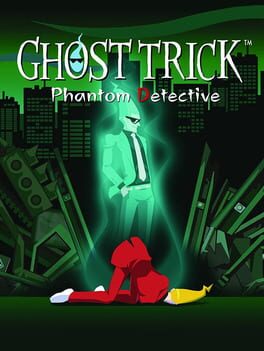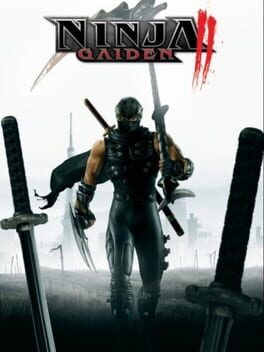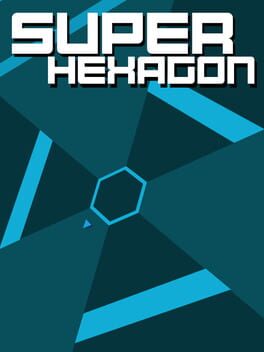Hattori
515 Reviews liked by Hattori
Quit after stage 4. In spite of a phenomenal soundtrack and an admirably rare, palpable sense of narrative stakes, I just can't get past the imprecision I feel these games suffer from. No incoming projectile feels reflexively dodgeable -- you have to untangle what the game wants you to do across numerous deaths and trudges through levels; or, just simply get lucky. Neither way feels particularly rewarding.
Some people may have the patience to master it, and I respect that... but I prefer my action a little less squirrely.
Some people may have the patience to master it, and I respect that... but I prefer my action a little less squirrely.
Sonic Adventure
1998
Elden Ring
2022
Those who see art as a shortcut to prestige have a very distorted idea of what is "prestigious" - Look Kojima, creating spiritual connections through eschatology, total genius -, And few of this horrible ilk exist like Neil druckmann or conrad roset. Guys who use the medium of video games as a platform to satisfy their hunger for prominence and recognition. and incidentally, along the way, dividing in a problematic way the reception and conception of "arthouse" and pop games
I'm not going to blame them for Little Nightmares being read as an empty and morbid trip, because before that there was Playdead with his Limbo.
Neither of the obsession with the tone and fixation with photorealism without a plastic sense more typical than seeing the pores of Nathan Drake's skin, but, God, how I would like a timeline in which Roset and Druckmann are considered the worst in a way unanimous. Because they may not be the worst in general in the horror pile, but their popularity exposes the sad reality that some are interested in video games being validated by those who do not appreciate them in all their aspects, and those who need them to carry an HBO series cosplay or Milanese exhibition box
____________________
the idea of how necessary any author was -beyond programmers- in videogames came to me for the first time playing Dragon Quarter "the shape of this game does not seem to be the product of chance or trends" said little Ardu at one time where he assumed that experimentation was the standard and the methodology to follow, the correct choice. Poor ignorant little Ardu.
In 2013 Little Ardu also said: "In the same year as Attack of the friday monsters, Drakengard 3, TW101, Proteus and Resogun... There is The Last of Us, this game that has enchanted me for its solidity and surprising humanity ( little Ardu didn't see that coming) but it's also the pinnacle of the formally conservative tv prestige show wannabe game type, which seems to be the way forward for pop games. mmmm maybe it's not that bad either? I mean it has overlapped many games that I consider better, but that always happens to me haha if one day justice will be done, but meanwhile, if the AAA are like that, maybe we will advance something "
Poor ignorant little Ardu.
I'm not going to blame them for Little Nightmares being read as an empty and morbid trip, because before that there was Playdead with his Limbo.
Neither of the obsession with the tone and fixation with photorealism without a plastic sense more typical than seeing the pores of Nathan Drake's skin, but, God, how I would like a timeline in which Roset and Druckmann are considered the worst in a way unanimous. Because they may not be the worst in general in the horror pile, but their popularity exposes the sad reality that some are interested in video games being validated by those who do not appreciate them in all their aspects, and those who need them to carry an HBO series cosplay or Milanese exhibition box
____________________
the idea of how necessary any author was -beyond programmers- in videogames came to me for the first time playing Dragon Quarter "the shape of this game does not seem to be the product of chance or trends" said little Ardu at one time where he assumed that experimentation was the standard and the methodology to follow, the correct choice. Poor ignorant little Ardu.
In 2013 Little Ardu also said: "In the same year as Attack of the friday monsters, Drakengard 3, TW101, Proteus and Resogun... There is The Last of Us, this game that has enchanted me for its solidity and surprising humanity ( little Ardu didn't see that coming) but it's also the pinnacle of the formally conservative tv prestige show wannabe game type, which seems to be the way forward for pop games. mmmm maybe it's not that bad either? I mean it has overlapped many games that I consider better, but that always happens to me haha if one day justice will be done, but meanwhile, if the AAA are like that, maybe we will advance something "
Poor ignorant little Ardu.
Drakengard
2003
this game requires no introduction anymore so i'm not beating around the bush. drakengard has been on my mind a fair bit recently - on the off chance you'll forgive a second log i think it's worth examining some of what the title accomplishes uniquely well, or what it's able to achieve with respect to the various titles that it's in conversation with. first of all: there's nothing quite as flatline-inducing or revealing of the author's own tendencies as reading that drakengard was intentionally poorly designed, a commonly held idea in various hobbyist communities frustratingly stemming just as often from its supporters as from its detractors. not only is this a frightfully pedantic and dull reduction of the text - it's also just an elaborately constructed fiction masking deeper truths. for instance, i think it's plain as day our burgeoning critical language still struggles with titles seemingly antithetical to traditional enjoyment, and are only able to escape from suffocating evaluative lexicon through irony or genre labels. survival horror isn't normally 'fun' & people appear willing to understand this so the genre gets a normative pass en masse, although it seems worth mentioning that the longer they exist in the public eye the more their mechanical frameworks get totally demystified by the public, arguably reducing them to vehicles for pleasure and gratification anyways, resident evil being the prime example.
drakengard, of course, isn't survival horror. it's largely a musou with some horror trappings, but it's rather plain about its affectation. however, because the traditional 'game' part of it is in such conflict with its aesthetic, we end up with the idea that this dissonance is a result of intentionally languid, engineered dissatisfaction. oh wow that wacky yoko taro wanted you to feel bad so he made his debut game bad. bzzzzt. wrong. square enix wanted a commercial success with drakengard. if they didn't, they wouldn't have requested that a project starting out as a simple remix of ace combat (owing massive inspiration to electrosphere in particular, another game that combines peerless arcade bluster with bleak narrative proceedings) would incorporate elements of its contemporary blockbuster peer, dynasty warriors. none of this is to say that drakengard can't be an awkward game, but it's in large part due to a friction with cavia's inexperience/lack of technical expertise, their attempts at holding true to their initial vision for the project, and square enix being desperate for a worthy competitor to koei tecmo's success.
here's where i'll stake a claim on something potentially contentious and risible. on the basis of the title's struggles in production & development, it is somewhat shocking that drakengard is not just 'not bad', but is a totally competent musou game. given the milieu in which it released, you might even dare to call it 'good', or 'well-made'. i'll double down with something absolutely no one wants to hear: most people have no point of reference because musou is rarely put in its historic context, appreciated for its strengths, or even, broadly speaking, played. disregarding popular experimental offshoot licensed games which carry their own unique magnetism, dynasty warriors has an especially prevalent stigma in contemporary action game circles, and few seem willing to return to reevaluate the franchise. if we accept this as the case, we can begin to understand why nostalgia is the primary driver of fondness for early musou, and why you always hear dynasty warriors 3 is the best one. 'load of bull', you say, 'drakengard is not good', you say, 'dynasty warriors sold millions and is beloved for inventing the drama; surely it's better', you say, but take a look at these admittedly small sample sizes (evidence A and evidence B) and you tell me which is actually the niche ip at present. one of these broader game worlds got a FFXIV collaboration. it was not dynasty warriors.
anyways the idea that drakengard could be a respected peer to dynasty warriors - or even, perhaps, better - is not ahistorical. drakengard came out in 2003, only a few months after the release of dynasty warriors 4. by this point in the dynasty warriors timeline, your only sources of inspiration for the musou canon are dynasty warrior 2 and dynasty warriors 3. they're fine games for what they are - content-rich, pop recontextualizations of romance of the three kingdoms that fold the intense political drama, grandiose character dynamics, and poeticizing of feudal history intrinsic to the novel and morphs them into larger-than-life battles of one against one hundred. it works for that series, but having played dynasty warriors 3, it's also very simply orchestrated. DW3 is kinetic and energetic, sure, but form is not function. as a still nascent series, DW3 has yet to experiment with elements that would come to define later entries, such as a strong emphasis on field management - its presence in 3 is largely muted and, dependent upon your stats, can often be negated. it is mostly a game of fulfilling your objectives, grinding up your stats, and engaging in undemanding combat pulling the same strong combo strings against some unique generals and a multitude of carbon copy generic ones. and i happen to appreciate it for what it is, but there is no question in my mind if you slotted that exact same mechanical framework into drakengard's tone and setting, it would be similarly deemed bad on purpose.
other than its tone what does drakengard do differently from this purely mechanical perspective? honestly, not too much from DW3! archers are still often priority targets, because if you don't prioritize them you will get knocked off yourhorse dragon. mission structure is usually quite similar, arguably with a bit less back and forth. combos require virtually the exact same input. the camera in both games is kind of fucked up. aside from abstruse unlock requirements and a...unique, system of progression, the biggest differences are mostly relegated to additions rather than subtractions. there are more enemy designs than just grunt soldiers. you can dodge now. the game is weapon-driven rather than character-driven ala DW3, which allows for its own form of unique experimentation. the soundtrack is excellent, i'm not accepting complaints. to aid in breaking up the pace, there are aerial missions that play somewhat comparably to panzer dragoon on-rail segments which are actually quite fun; likewise, the hybrid missions allow for angelus to be used as a means of offence in ground warfare and rain hellfire from above. it keeps things relatively varied. there's no troops to manage because caim is fighting a losing war and willingly formed a pact with the only being capable of potentially turning the tides, and the game is content to use the musou form to communicate ideas about caim and angelus to great effect.
of course, it's the narrative which gives drakengard a lot of its greatest texture (and is also demonstrative of its greatest strengths and appeals as a DW clone), but we can save discussion of that for some other time; for now it's more important for me to say that it's not quite the outright condemnation of violence through ludology that so many claim it is (it's far more interested in more subtle forms of violence than the explicit and ceaseless murder it depicts anyways). really, this was just a self-indulgent exercise in placing drakengard in its historic context once and for all, away from all the retrospectives it's been getting as a result of nier's runaway success. drakengard is a game that won't be for most, but it's a game that's lingered in my memory long since i first played it. it takes an, at the time, relatively new genre, and through sheer passion and dedication spins it into a uniquely transgressive idea while still remaining an enjoyable title to let unfold. if it feels numbing or meditative, that's more or less the exact emotional resonance that something like DW3 is targeting - drakengard just uses it to achieve more things than a sense of gratifying white noise. it remains peerless because of all of its contradictions, because of how messy and thorny it is as a game, and because we'll never see anything approaching this utterly unique interplay of emotional rhythms and macabre, uncanny storytelling wearing the skin of its crowdpleasing predecessors ever again.
drakengard, of course, isn't survival horror. it's largely a musou with some horror trappings, but it's rather plain about its affectation. however, because the traditional 'game' part of it is in such conflict with its aesthetic, we end up with the idea that this dissonance is a result of intentionally languid, engineered dissatisfaction. oh wow that wacky yoko taro wanted you to feel bad so he made his debut game bad. bzzzzt. wrong. square enix wanted a commercial success with drakengard. if they didn't, they wouldn't have requested that a project starting out as a simple remix of ace combat (owing massive inspiration to electrosphere in particular, another game that combines peerless arcade bluster with bleak narrative proceedings) would incorporate elements of its contemporary blockbuster peer, dynasty warriors. none of this is to say that drakengard can't be an awkward game, but it's in large part due to a friction with cavia's inexperience/lack of technical expertise, their attempts at holding true to their initial vision for the project, and square enix being desperate for a worthy competitor to koei tecmo's success.
here's where i'll stake a claim on something potentially contentious and risible. on the basis of the title's struggles in production & development, it is somewhat shocking that drakengard is not just 'not bad', but is a totally competent musou game. given the milieu in which it released, you might even dare to call it 'good', or 'well-made'. i'll double down with something absolutely no one wants to hear: most people have no point of reference because musou is rarely put in its historic context, appreciated for its strengths, or even, broadly speaking, played. disregarding popular experimental offshoot licensed games which carry their own unique magnetism, dynasty warriors has an especially prevalent stigma in contemporary action game circles, and few seem willing to return to reevaluate the franchise. if we accept this as the case, we can begin to understand why nostalgia is the primary driver of fondness for early musou, and why you always hear dynasty warriors 3 is the best one. 'load of bull', you say, 'drakengard is not good', you say, 'dynasty warriors sold millions and is beloved for inventing the drama; surely it's better', you say, but take a look at these admittedly small sample sizes (evidence A and evidence B) and you tell me which is actually the niche ip at present. one of these broader game worlds got a FFXIV collaboration. it was not dynasty warriors.
anyways the idea that drakengard could be a respected peer to dynasty warriors - or even, perhaps, better - is not ahistorical. drakengard came out in 2003, only a few months after the release of dynasty warriors 4. by this point in the dynasty warriors timeline, your only sources of inspiration for the musou canon are dynasty warrior 2 and dynasty warriors 3. they're fine games for what they are - content-rich, pop recontextualizations of romance of the three kingdoms that fold the intense political drama, grandiose character dynamics, and poeticizing of feudal history intrinsic to the novel and morphs them into larger-than-life battles of one against one hundred. it works for that series, but having played dynasty warriors 3, it's also very simply orchestrated. DW3 is kinetic and energetic, sure, but form is not function. as a still nascent series, DW3 has yet to experiment with elements that would come to define later entries, such as a strong emphasis on field management - its presence in 3 is largely muted and, dependent upon your stats, can often be negated. it is mostly a game of fulfilling your objectives, grinding up your stats, and engaging in undemanding combat pulling the same strong combo strings against some unique generals and a multitude of carbon copy generic ones. and i happen to appreciate it for what it is, but there is no question in my mind if you slotted that exact same mechanical framework into drakengard's tone and setting, it would be similarly deemed bad on purpose.
other than its tone what does drakengard do differently from this purely mechanical perspective? honestly, not too much from DW3! archers are still often priority targets, because if you don't prioritize them you will get knocked off your
of course, it's the narrative which gives drakengard a lot of its greatest texture (and is also demonstrative of its greatest strengths and appeals as a DW clone), but we can save discussion of that for some other time; for now it's more important for me to say that it's not quite the outright condemnation of violence through ludology that so many claim it is (it's far more interested in more subtle forms of violence than the explicit and ceaseless murder it depicts anyways). really, this was just a self-indulgent exercise in placing drakengard in its historic context once and for all, away from all the retrospectives it's been getting as a result of nier's runaway success. drakengard is a game that won't be for most, but it's a game that's lingered in my memory long since i first played it. it takes an, at the time, relatively new genre, and through sheer passion and dedication spins it into a uniquely transgressive idea while still remaining an enjoyable title to let unfold. if it feels numbing or meditative, that's more or less the exact emotional resonance that something like DW3 is targeting - drakengard just uses it to achieve more things than a sense of gratifying white noise. it remains peerless because of all of its contradictions, because of how messy and thorny it is as a game, and because we'll never see anything approaching this utterly unique interplay of emotional rhythms and macabre, uncanny storytelling wearing the skin of its crowdpleasing predecessors ever again.
LSD: Dream Emulator
1998
When I was 15 or so and I first discovered this game by way of AzuriteReaction throwing his controller at a CRT over a low-poly dragon slowly floating towards the screen, I think it would be a while before I actually appreciated this game for what it was, an ambitious, way-ahead-of-its-time, baffling and insanely creative piece of interactive art.
LSD: Dream Emulator, to this day, is one of the most confounding and strange experiences someone can have playing a video game. It's purposefully confusing and obtuse, its a bit of a clunky mess controls wise, and the dated, low-poly, jaggy graphics might put some off, but honestly, to me, they only add to how surreal the experience of playing this thing is.
Think about it though, this is a true to form walking simulator decades before that would even become an accepted term, and a really good one too, honestly. The atmosphere ranges from chipper to darkly surreal on a whim, there are tons of random events and oddities to stumble into, the game gets more and more gleefully warped as you progress, and despite the limitations, this game is graphically speaking, perfectly ugly-beautiful.
Did I mention the soundtrack? Not even joking when I say the LSD and Remixes CD that originally came with the game might be one of the best IDM albums of all time. Banger after banger.
If you ever get the chance to play it on an actual PS1 or decide to set up an emulator for it, I think it's a game that everyone into more experimental games should experience at least once, it's perhaps the first example of its kind and it deserves its reputation as one of the most gloriously twisted games ever made.
LSD: Dream Emulator, to this day, is one of the most confounding and strange experiences someone can have playing a video game. It's purposefully confusing and obtuse, its a bit of a clunky mess controls wise, and the dated, low-poly, jaggy graphics might put some off, but honestly, to me, they only add to how surreal the experience of playing this thing is.
Think about it though, this is a true to form walking simulator decades before that would even become an accepted term, and a really good one too, honestly. The atmosphere ranges from chipper to darkly surreal on a whim, there are tons of random events and oddities to stumble into, the game gets more and more gleefully warped as you progress, and despite the limitations, this game is graphically speaking, perfectly ugly-beautiful.
Did I mention the soundtrack? Not even joking when I say the LSD and Remixes CD that originally came with the game might be one of the best IDM albums of all time. Banger after banger.
If you ever get the chance to play it on an actual PS1 or decide to set up an emulator for it, I think it's a game that everyone into more experimental games should experience at least once, it's perhaps the first example of its kind and it deserves its reputation as one of the most gloriously twisted games ever made.
LSD: Dream Emulator
1998
LSD: Dream Emulator
1998
you hear the one about avid players of tetris? their minds basically get rewritten because of exposure to the damn thing. thing is, this is true of any earthly activity that brings together body, mind, and soul. its psychosomatic, kinaesthetic. any activity that informs consciousness will bleed into the subconscious. my dreams aren't really like the ones LSD presents, but my fear is that they will be.
a product of its time in all the ways that matter and bolstered as a result. psx architecture struggling under the weight of hell and failing to load in the density of its worlds in time leaves the mind incapable of guarding itself for whats going to happen next - legitimately unsettling, unpredictable, uncanny, uncaring. youre sieved through textures and atmospheres at a rapid clip. no barriers exist here, everything is simply a permeable membrane. every scene, vignette, happenstance, and interaction a stitched-together quilt one night and a tesseract the next. like any work of its kind it requires a certain level of maturity and commitment - particularly these days when the only thing you can reliably bet on about an audience is their urge to demystify - but you ought to take the leap. this is really affecting work here that i cant possibly be cynical about and a great alternative to melatonin
a product of its time in all the ways that matter and bolstered as a result. psx architecture struggling under the weight of hell and failing to load in the density of its worlds in time leaves the mind incapable of guarding itself for whats going to happen next - legitimately unsettling, unpredictable, uncanny, uncaring. youre sieved through textures and atmospheres at a rapid clip. no barriers exist here, everything is simply a permeable membrane. every scene, vignette, happenstance, and interaction a stitched-together quilt one night and a tesseract the next. like any work of its kind it requires a certain level of maturity and commitment - particularly these days when the only thing you can reliably bet on about an audience is their urge to demystify - but you ought to take the leap. this is really affecting work here that i cant possibly be cynical about and a great alternative to melatonin
Going from the original to this is a significant leap ahead, a swansong that pays its tribute to the miles and miles of experience, refined to such a degree that you can really feel it to an almost clinical level. In a sense this already fails at matching up to what it's paying respect to years in the past, as its edge is mostly sanded, the unique artistry of the single stream of consciousness replaced by a more general structure. Things rise, things fall, go to one climactic finish that blissfully spreads its message of a loving companionship versus the mechanical ends of humanity.
But yeah I love that more. An easy victim to the usual, the violent swells, the compounding final boss rush, the absolute insanity of an XBLA-vibe masterwork. What I felt with the original was that it lacked "impact", and even though it's on the more appreciation-over-time end, I kind of kicked its ass. It was too easy for me on Normal and I didn't spend a credit. The almost-but-not-quite formless nature of most of its music enshrouding its levels left me feeling very miffed and unflinching towards things on an initial level. For whatever inexplicable reason, though it's significantly less of an innate strength in tone versus the OG's harsh and heavy beat vibetown, I could really feel the energy through each mission in Star Successor. But it's definitely possible that it's more many things coming together in ways that definitely appeal to me way more. Treasure is simply encapsulating the most awesome parts and aesthetical sensibilities of the generation they're in.
Of course, the biggest demonstration Star Successor has on offer is how it has simply mastered layered action in its gameplay. There's actually such cool shit to how bullet patterns and enemies come together onto your mental stack, testing significantly more within its frame of movement than ever before. If nothing else, Star Successor is quite literally the best mechanical rail shooter, and it's lovingly difficult!!! Despite the intense "who the fuck would want to 1cc this" length, each mission is a perfectly paced piece with some of the best positional boss battles to rival most action games! While not the exact back-to-back variety you'll see on the N64 the whole of Star Successor also doesn't feel like it quite ever does the same thing twice, although there's some overlap. I was so expressively losing myself in the final stage too. Real piercing the heavens stuff. Good shit.
I apologize though, you'll have to forgive me for comparing the two so strictly. Star Successor is not Trying to be the original again, and while there's merit to meshing the two together to see their more apparent differences and how much the developers have grown, it's still a battle of appeals. People should be playing both of these because as a sequence they're reflective on the absolute best of us and how that culture of the best of us moves over time. The most poignant note is that we'll be making 100 different versions on the same determination of our spiral united power, yet still result in beautiful wholly unique stars that inspire the way forward.
But yeah I love that more. An easy victim to the usual, the violent swells, the compounding final boss rush, the absolute insanity of an XBLA-vibe masterwork. What I felt with the original was that it lacked "impact", and even though it's on the more appreciation-over-time end, I kind of kicked its ass. It was too easy for me on Normal and I didn't spend a credit. The almost-but-not-quite formless nature of most of its music enshrouding its levels left me feeling very miffed and unflinching towards things on an initial level. For whatever inexplicable reason, though it's significantly less of an innate strength in tone versus the OG's harsh and heavy beat vibetown, I could really feel the energy through each mission in Star Successor. But it's definitely possible that it's more many things coming together in ways that definitely appeal to me way more. Treasure is simply encapsulating the most awesome parts and aesthetical sensibilities of the generation they're in.
Of course, the biggest demonstration Star Successor has on offer is how it has simply mastered layered action in its gameplay. There's actually such cool shit to how bullet patterns and enemies come together onto your mental stack, testing significantly more within its frame of movement than ever before. If nothing else, Star Successor is quite literally the best mechanical rail shooter, and it's lovingly difficult!!! Despite the intense "who the fuck would want to 1cc this" length, each mission is a perfectly paced piece with some of the best positional boss battles to rival most action games! While not the exact back-to-back variety you'll see on the N64 the whole of Star Successor also doesn't feel like it quite ever does the same thing twice, although there's some overlap. I was so expressively losing myself in the final stage too. Real piercing the heavens stuff. Good shit.
I apologize though, you'll have to forgive me for comparing the two so strictly. Star Successor is not Trying to be the original again, and while there's merit to meshing the two together to see their more apparent differences and how much the developers have grown, it's still a battle of appeals. People should be playing both of these because as a sequence they're reflective on the absolute best of us and how that culture of the best of us moves over time. The most poignant note is that we'll be making 100 different versions on the same determination of our spiral united power, yet still result in beautiful wholly unique stars that inspire the way forward.
If you put me in a room of trash talkers who want to play this particular Smash Bros., I'll gladly pick Samus and snipe people like a cheap bastard and have a great time. (And by "play," I mean a multiplayer brawl, not a stripped-down one-on-one fight. I'm sorry tourney nerds, but Smash is an uninteresting one-on-one fighter. You suck the fun and uniqueness out of Smash Bros. when you sanitize it in the name of some conservative notion of competition.)
But from a critical standpoint, Super Smash Bros. Ultimate has been spit-polished to the point where it registers as very made-by-committee and antiseptic. Its distinguishing characteristic is a ridiculous amount of content (a word that shouldn't be confused with creativity). The number of characters is obscene when one recalls the main appeal of Smash Bros.: pitting the most iconic and popular Nintendo characters against each other. Now everyone shows up for the sake of random fan demands and Nintendo's almighty bottom line. All the stars from the non-Nintendo games, as well as the Nintendo-branded characters who don't deserve to be mentioned in the same breath as your Marios and Kirbys, betray the notion that we're watching larger-than-life Nintendo figures fight it out. I don't care about Ryu from Street Fighter trading blows with Cloud from Final Fantasy. Does Ryu really need to be in another game? I can raise the same question for others. Ultimate may not be an open world game, but it champions a similar type of quantity-over-quality philosophy. Meanwhile, as fine-tuned as the controls are in Ultimate, I still vastly prefer the faster flow and more dangerous vibes of Super Smash. Bros Melee (which introduced the most fascinating stages in the series: Hyrule Kingdom and Brinstar Depths). Ultimate feels quite safe despite the lofty implications of its title.
But from a critical standpoint, Super Smash Bros. Ultimate has been spit-polished to the point where it registers as very made-by-committee and antiseptic. Its distinguishing characteristic is a ridiculous amount of content (a word that shouldn't be confused with creativity). The number of characters is obscene when one recalls the main appeal of Smash Bros.: pitting the most iconic and popular Nintendo characters against each other. Now everyone shows up for the sake of random fan demands and Nintendo's almighty bottom line. All the stars from the non-Nintendo games, as well as the Nintendo-branded characters who don't deserve to be mentioned in the same breath as your Marios and Kirbys, betray the notion that we're watching larger-than-life Nintendo figures fight it out. I don't care about Ryu from Street Fighter trading blows with Cloud from Final Fantasy. Does Ryu really need to be in another game? I can raise the same question for others. Ultimate may not be an open world game, but it champions a similar type of quantity-over-quality philosophy. Meanwhile, as fine-tuned as the controls are in Ultimate, I still vastly prefer the faster flow and more dangerous vibes of Super Smash. Bros Melee (which introduced the most fascinating stages in the series: Hyrule Kingdom and Brinstar Depths). Ultimate feels quite safe despite the lofty implications of its title.
É repetitivo e é um retrocesso em questão de exploração em comparação ao DS1, é o mais linear dos jogos da From, mesmo eu gostando dos cenários eles são totalmente desconexos, tem a lore mais fraca dos Souls e mais desinteresse do que a de Demon's, metade do jogo é fanservice mascado do DS1, e as bonfires são muito mal pensadas; outra coisa, a trilha sonora é, mas muito massificado, desde a música de menu até as OST's mais fodas, todas as OST's tentam ser muito mais épicas que as outras, que perde um pouco de peso, até certa parte, algumas parecem muito semelhantes, pelo menos 1/3 da trilha sonora é totalmente esquecível pelo menos que eu já citei, tal como o design de mundo do jogo. Eu só subi a nota por causa que a Sister Friede e o Gael são os responsáveis por umas das melhores boss fights de toda a franquia, e que apesar de merecido, eu ainda tenho várias críticas ao jogo base.
this game is absolutely phenomenal, dare I say it's even better than any ace attorney. short and sweet, this game doesn't suffer from bad pacing, everything is p straight-forward, the puzzles were just right, no need to rip my hair out or smth, everything went pretty smooth, the music is so good and the character designs are really bright and unique as well as their personalities. i can't go into spoilers because this game just needs to be played blind. one of the rare games that got me so immersed and obsessed to just finish it because the plot is so appealing and makes you just wish to know what's the deal here. 5/5 from me also missile my most beloved doggo <3
Ninja Gaiden II
2008
Leaving aside the fact that my previous reviews Itagaki's Ninja Gaiden 2 and WET were the result of drunken nights and carousing, I still have a genuine interest in how some video games confidently carry a "Vulgar" aesthetic in times where the masses concentrate on photorealism, pixel art or cutewholesomethang (maybe?)
Let's also leave aside the fact that for video games, exploitation, in every sense of the word, is like a lung.
________-_
Both Itagaki's ninja gaiden and WET have the will to inherit the most vulgar and savage aesthetics of Asian exploitation cinema, and its derivatives, only one does it passively and the other seems to be desperately looking for it, like comparing Chang Cheh vs Tarantino.
God forgive me.
Itagaki's ninja gaiden is at its core, in spirit more like the films it wants to be a playable response to -let's say Chang Cheh's cinema-, Ninja Gaiden is a wild, aggressive product for the player, who doesn't really care in excess for pleasing everyone and that guards its greatness in deep places that not everyone is willing to reach, although visually it is everything that at the beginning of the HD era and the great recession was asked of an AAA; it relies on clean, powerful imagery, a hyper-stylized plastic sense with attention to toned bodies, fluids, fabrics and movement, and had a strong cinematic component.
instead, WET is more like a Tarantino movie. Not like it stays in an egofalocentric pastiche that depends on the ignorance or incuriosity of people like Kill Bill was, but although it hurts me the reality is that WET has a -great- very interesting action premise that is tamed by a worthy planning of an AAA or study budget-at best-where the epidermal is the substance. Littering the already-suffering 30-frame image full of jagged edges and blurriness with burnt filters, stock sounds, and transitions that attempt to emulate a Grindhouse experience is certainly daring for a game whose playable core is efficiency and reflexes. the result pushes the game to exist as a short, cheap and unhygienic party, but very enjoyable, which unlike Tarantino does have a somewhat vulgar rebellious spirit.
Not that good as NGII, but hey.
Let's also leave aside the fact that for video games, exploitation, in every sense of the word, is like a lung.
________-_
Both Itagaki's ninja gaiden and WET have the will to inherit the most vulgar and savage aesthetics of Asian exploitation cinema, and its derivatives, only one does it passively and the other seems to be desperately looking for it, like comparing Chang Cheh vs Tarantino.
God forgive me.
Itagaki's ninja gaiden is at its core, in spirit more like the films it wants to be a playable response to -let's say Chang Cheh's cinema-, Ninja Gaiden is a wild, aggressive product for the player, who doesn't really care in excess for pleasing everyone and that guards its greatness in deep places that not everyone is willing to reach, although visually it is everything that at the beginning of the HD era and the great recession was asked of an AAA; it relies on clean, powerful imagery, a hyper-stylized plastic sense with attention to toned bodies, fluids, fabrics and movement, and had a strong cinematic component.
instead, WET is more like a Tarantino movie. Not like it stays in an egofalocentric pastiche that depends on the ignorance or incuriosity of people like Kill Bill was, but although it hurts me the reality is that WET has a -great- very interesting action premise that is tamed by a worthy planning of an AAA or study budget-at best-where the epidermal is the substance. Littering the already-suffering 30-frame image full of jagged edges and blurriness with burnt filters, stock sounds, and transitions that attempt to emulate a Grindhouse experience is certainly daring for a game whose playable core is efficiency and reflexes. the result pushes the game to exist as a short, cheap and unhygienic party, but very enjoyable, which unlike Tarantino does have a somewhat vulgar rebellious spirit.
Not that good as NGII, but hey.
Super Hexagon
2012
While I can't help but admire Terry Cavanagh's commitment to his concept, Super Hexagon is more compelling to watch than to play. The visuals have a unique hypnotic beauty, and you can even close your eyes and get lost in Chipzel's urgent, ever-evolving soundtrack. But as an arcade-style challenge, Super Hexagon doesn't keep me coming back for more. Its simplicity is its greatest strength and weakness. The paradox follows: Super Hexagon would be less remarkable if it were more complex, yet I find myself wanting more of a reason to stay engaged as a player outside of getting used to the game's patterns to arrive at a sense of accomplishment. Being a mere spectator allows me to focus on Cavanagh's artistic conviction as well as relish the interplay between Chipzel's music, the pulsing shapes, and the constant string of narrowly avoided collisions; playing Super Hexagon leads me to question its long-term experiential appeal.
